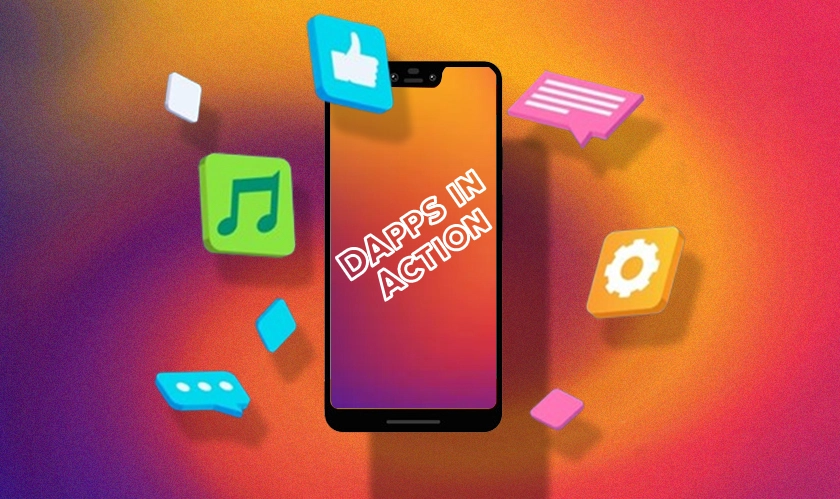Home Technology Mobile DApps in Action: 4 Case Studie...
Mobile

CIO Bulletin
01 May, 2024
DApps have transitioned from niche concepts circulated in underground tech communities to innovative, customer-forward applications that give control back to the end-user.
Control is key here. Typically, a web app runs on a network that is owned entirely by a company.
Millions of users may use the app, but a single entity maintains total control. They can control the flow of content and track user activity at their leisure. dApps flip this on its head and put control back in the user’s hands.
We could give a bullet point list about why this is beneficial, but how about we just show you?
The world of decentralized finance: PancakeSwap
Let’s start with the obvious—decentralized finance. PancakeSwap’s BNB-powered decentralized exchange launched in 2020 as a remedy for the rigidity of the traditional banking sector.
The app lets people trade CAKE tokens—PancakeSwap’s native currency—using different cryptocurrencies. They can even put tokens in a liquidity pool to earn shares of the trading fees from people trading against said pool.
But why does this matter? Well, the kicker is that users can do all of this without relying on a middleman. Decentralization means no banks and brokers—gatekeepers, begone. Anyone from around the world can trade and earn without reporting to a central authority.
This makes it faster (and cheaper) to trade financial products. Users don’t need to wait for a seller to trade tokens. They simply put the token they want to trade into the pool and withdraw the token they want to receive. It’s near-instantaneous, and the app doesn’t charge a fee.
PancakeSwap’s impact on the financial sector is profound. Decentralization means privacy and security are automatic. Your identity is secret by default. The app removes barriers to entry and democratizes finance for all. It’s revolutionizing what we expect from finance.
Revolutionizing the gaming landscape: Pixels
Pixels has experienced a meteoric rise in the last year. It recently became the first crypto game since Axie Infinity to soar past 100,000 daily average users, and for a good reason.
The Web3 dApp is a social MMO farming game that gives users a plot of land that they can customize and maintain. They can farm pixels by gathering resources and completing quests in the metaverse.
What sets it apart from every other conventional MMO on the market? Pixels lets you make money as you play. Progress is tied to your NFT and stored on your blockchain. The more you grow your farm, the more you earn. One pixel equates to $0.67 as of April 2024.
Why does this matter? Aside from offering a completely immersive experience—your virtual farm is a genuine source of income—Pixels creates new economic opportunities for its players.
Pixels’ real impact is that it’s one of the first games to show that dApps can take a ‘fun first’ approach without compromising on decentralization and financial incentives. It’s a new way to socialize and earn without the barriers of traditional property ownership.
Social media with a difference: Mastodon
The social media landscape is undeniably commercialized. Head to Facebook, and you’ll immediately be bombarded with ads and algorithms designed by paying corporations—everyone wants to sell you something or something else.
Mastodon flips this on its head. The social media dApp is completely customizable and free from algorithms. There’s no ulterior motive. Users have complete control over what they see in their feeds. And any content that is displayed is entirely chronological.
No ads means users never feel like they’re being sold to. The decentralization of the app means rules and regulations are enforced locally rather than top-down by a single entity. Users can join servers or create their own to make their own subsections of the internet.
DApps like Mastodon are the future of social media. The power to create and connect is back in the hands of the users.
The power of decentralized VPNs
VPNs are under threat in the current digital landscape. A single point of failure means attackers only need to find one point of entry for data to be exposed.
Add in the possibility of VPN providers collecting user logs to store or sell (even when they say they don’t), and it seems the authenticity of the ‘P’ in VPN is repeatedly coming under scrutiny.
This VPN tackles this issue by distributing trust and traffic across a network of nodes. Each node that makes up the network is individually secure. Rather than relying on a central VPN provider to protect user privacy, users access the dVPN via residential IPs.
This makes it harder for hackers to intercept data—if one node is compromised, it doesn’t impact the rest of the network. It also means user logs can’t be collected.
Plus, as there is no centralized service provider and IPs are constantly changing, it’s impossible for ISPs to block you. That means you can access all of the location-specific content you like whenever you like.







